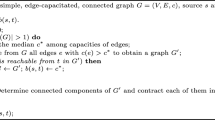Abstract
We give a simple primal algorithm for the generalized maximum flow problem that repeatedly finds and cancels generalized augmenting paths (GAPs). We use ideas of Wallacher (A generalization of the minimum-mean cycle selection rule in cycle canceling algorithms, 1991) to find GAPs that have a good trade-off between the gain of the GAP and the residual capacity of its arcs; our algorithm may be viewed as a special case of Wayne’s algorithm for the generalized minimum-cost circulation problem (Wayne in Math Oper Res 27:445–459, 2002). Most previous algorithms for the generalized maximum flow problem are dual-based; the few previous primal algorithms (including Wayne in Math Oper Res 27:445–459, 2002) require subroutines to test the feasibility of linear programs with two variables per inequality (TVPIs). We give an O(mn) time algorithm for finding negative-cost GAPs which can be used in place of the TVPI tester. This yields an algorithm with O(m log(mB/ε)) iterations of O(mn) time to compute an ε-optimal flow, or O(m 2 log (mB)) iterations to compute an optimal flow, for an overall running time of O(m 3 nlog(mB)). The fastest known running time for this problem is \(\tilde{O}(m^2n\log B)\) , and is due to Radzik (Theor Comput Sci 312:75–97, 2004), building on earlier work of Goldfarb et al. (Math Oper Res 22:793–802, 1997).
Similar content being viewed by others
References
Aspvall B. and Shiloach Y. (1990). A polynomial time algorithm for solving systems of linear inequalities with two variables per inequality. SIAM J. Comput. 9: 827–845
Aspvall, B.I.: Efficient Algorithms for Certain Satisfiability and Linear Programming Problems. PhD thesis, Department of Computer Science, Stanford University, August 1980. Also appears as Technical Report STAN-CS-80-822
Bertsekas D.P. and Tseng P. (1998). Relaxation methods for minimum cost ordinary and generalized network flow problems. Oper. Res. 36: 93–114
Cherkassky B.V. and Goldberg A.V. (1999). Negative-cycle detection algorithms. Math. Programm. 85: 277–311
Cohen E. and Megiddo N. (1994). Improved algorithms for linear inequalities with two variables per inequality. SIAM J. Comput. 23: 1313–1347
Cohen E. and Megiddo N. (1994). New algorithms for generalized network flows. Math. Programm. 64: 325–336
Cormen T.H., Leiserson C.E. and Rivest R.L. (1990). Introduction to Algorithms. MIT Press, Cambridge
Dantzig G.B. (1963). Linear Programming and Extensions. Princeton University Press, Princeton
Dash Optimization. XPRESS-MP 2004D, 2004
Edmonds J. and Karp R.M. (1972). Theoretical improvements in algorithmic efficiency for network flow problems. J. ACM 19: 248–264
Fleischer L.K. and Wayne K.D. (2002). Fast and simple approximation schemes for generalized flow. Math. Programm. 91: 215–238
Garg, N., Könemann, J.: Faster and simpler algorithms for multicommodity flow and other fractional packing problems. In: Proceedings of the 39th IEEE Symposium on the Foundations of Computer Science, pp 300–309 (1998)
Goldberg A.V., Plotkin S.A. and Tardos É. (1991). Combinatorial algorithms for the generalized circulation problem. Math. Oper. Res. 16: 351–381
Goldberg A.V. and Tarjan R.E. (1989). Finding minimum-cost circulations by canceling negative cycles. J. ACM 36: 873–886
Goldfarb D. and Jin Z. (1996). A faster combinatorial algorithm for the generalized circulation problem. Math. Oper. Res. 21: 529–539
Goldfarb D., Jin Z. and Lin Y. (2002). A polynomial dual simplex algorithm for the generalized circulation problem. Math. Programm. 91: 271–288
Goldfarb D., Jin Z. and Orlin J.B. (1997). Polynomial-time highest-gain augmenting path algorithms for the generalized circulation problem. Math. Oper. Res. 22: 793–802
Gondran M. and Minoux M. (1984). Graphs and Algorithms. Wiley, New York
Grinold R.C. (1973). Calculating maximal flows in a network with positive gains. Oper. Res. 21: 528–541
Hochbaum D.S. and Naor J. (1994). Simple and fast algorithms for linear and integer programs with two variables per inequality. SIAM J. Comput. 23: 1179–1192
ILOG. CPLEX 9.0, 2003
Jensen P.A. and Bhaumik G. (1977). A flow augmentation approach to the network with gain minimum cost flow problem. Management Science 23: 631–643
Jewell W.S. (1962). Optimal flow through networks with gains. Oper. Res. 10: 476–499
Kleinberg J. and Tardos É. (2006). Algorithm Design. Addison-Wesley, Reading
Klingman D., Napier A. and Stutz J. (1974). NETGEN: a program for generating large scale capacitated assignment, transportation, and minimum cost flow network problems. Manage. Sci. 20: 814–821
Maurras J.F. (1972). Optimization of the flow through networks with gains. Math. Programm. 3: 135–144
Minieka E. (1972). Optimal flow in a network with gains. INFOR 10: 171–178
Oldham J.D. (2001). Combinatorial approximation algorithms for generalized flow problems. J. Algorithms 38: 135–169
Onaga K. (1967). Optimum flows in general communications networks. J. Franklin Inst. 283: 308–327
Radzik T. (1998). Faster algorithms for the generalized network flow problem. Math. Oper. Res. 23: 69–100
Radzik T. (2004). Improving time bounds on maximum generalised flow computations by contracting the network. Theor. Comput. Sci. 312: 75–97
Radzik T. and Yang S. (2001). Experimental evaluation of algorithmic solutions for the maximum generalised flow problem. Technical Report TR-01-09, Department of Computer Science, King’s College, London
Tardos É. and Wayne K.D. (1998). Simple generalized maximum flow algorithms. In: Bixby, R.E., Boyd, E.A. and Ríos-Mercado, R.Z. (eds) Integer Programming and Combinatorial Optimization, number 1412 in Lecture Notes in Computer Science, pp 310–324. Springer, New York
Truemper, K.: Optimal Flows in Networks with Positive Gains. PhD thesis, Department of Operations Research, Case Western Reserve University, May 1973
Truemper K. (1977). On max flows with gains and pure min-cost flows. SIAM J. Appl. Math. 32: 450–456
Tseng P. and Bertsekas D.P. (2000). An ε-relaxation method for separable convex cost generalized network flow problems. Math. Programm. 88: 85–104
Wallacher, C.: A generalization of the minimum-mean cycle selection rule in cycle canceling algorithms. Technical report, Institut für Angewandte Mathematik, Technische Universität Carolo-Wilhelmina, November 1991
Wayne K.D. (2002). A polynomial combinatorial algorithm for generalized minimum cost flow. Math. Oper. Res. 27: 445–459
Author information
Authors and Affiliations
Corresponding author
Additional information
David P. Williamson is supported in part by an IBM Faculty Partnership Award and NSF grant CCF-0514628.
Rights and permissions
About this article
Cite this article
Restrepo, M., Williamson, D.P. A simple GAP-canceling algorithm for the generalized maximum flow problem. Math. Program. 118, 47–74 (2009). https://doi.org/10.1007/s10107-007-0183-8
Received:
Accepted:
Published:
Issue Date:
DOI: https://doi.org/10.1007/s10107-007-0183-8




